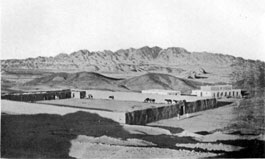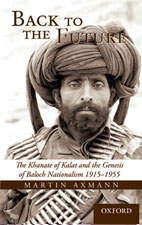|
|
 |
1902: Across
Coveted Lands or A Journey From Flushing (Holland) to Calcutta,
Overland, by A. Henry Savage Landor, 1902, gutenberg.org:
includes pictures and descriptions of Balochistan (search on
'Beluch,' 'Beluchistan' and 'Saindak') and pdf (large file) |
| In
Afghanistan's Shadow: Baluch Nationalism and Soviet Temptations. Selig
S. Harrison. New York and Washington: Carnegie Endowment, 1981 |
| Inside
Baluchistan, Political Autobiography of Khan-e-Azam Mir Ahmed
Yar Khan Baluch, Ex-Ruler of Kalat State. Ahmed Yar Khan,
Royal Book Company, 1975 |
| The
Weaknesses in the International Protection of Minority Rights,
by Javed Rehman, Kluwer Law International, 2000 |
| Baloch
Nationalism: Its Origin and Development by Taj Mohammad
Breseeg, 2004. To download a pdf of Mr. Breseeg's dissertation,
click here.
or here (scribd.com) |
| The Baloch and Their Neighbours: Ethnic and Linguistic Contact in Balochistan in Historical and Modern Times, Carina Jahani, Agnes Korn (eds.), Sep 28, 2007 |
| New: Back
to the Future: The Khanate of Kalat and the Genesis of Baloch
Nationalism 1915-1955,
by Martin Axmann, Oxford University Press:
The study investigates the genesis of Baloch nationalism during the first half
of the twentieth century, analyses the emergence of a Baloch national movement,
and sets it into relation to therise of an Indian and Muslim Indian national
movement in British India during that time. The study portrays the decline and
disintegration of the Baloch khanate of Kalat during the last decades of British
rule and summarizes the colonial legacy of Balochistan in respect of its political,
administrative, and constitutional development. |
 |
| Balochi
grammar: A
Grammar, Phrase Book and Vocabulary of Baluchi (as Spoken
in the Sultanate of Oman), by Major N.A.Collett MA FRAS, publ:
6th Queen Elizabeth's Own Gurkha Rifles and late of the Sultan's
Service, 1983 |
|
|
|
|
|
|
|
|
|
|
|
|
|
|
|
|
|
|
|
| On Development Economics: |
| Article:
Chomsky: Poorer Countries Find a Way to Escape U.S. Dominance; By Michael Shank, Foreign Policy in Focus, February 12, 2008: ...
Actually what's happening in Bolivia is a striking example. The mostly white, Europeanized elite, which is a minority, happens to be sitting on most of the hydrocarbon reserves. And for the first time Bolivia is becoming democratic. So it's therefore bitterly hated by the West, which despises democracy, because it's much too dangerous. But when the indigenous majority actually took political power for the first time, in a very democratic election of the kind we can't imagine here, the reaction in the West was quite hostile. I recall, for example, an article - I think it was the Financial Times - condemning Morales as moving towards dictatorship because he was calling for nationalization of oil. They omitted to mention, with the support of about 90% of the population. But that's tyranny. Tyranny means you don't do what the United States says. Just like moderation means that you're like Saudi Arabia and you do do what we say.
|
| Bad Samaritans, by Ha-Joon Chang, review by Chalmers Johnson, truthdig.org, Jan 24, 2008: His new book is a discursive, well-written account of what he calls the “Bad Samaritans,” “people in the rich countries who preach free markets and free trade to the poor countries in order to capture larger shares of the latter's markets and preempt the emergence of possible competitors. They are saying ‘do as we say, not as we did'... |
| The Shock Doctrine, by Naomi Klein, The Telegraph, Sept 22, 2007: "A new gangster class capitalises on conflicts . . ."; in Truthout.org: "The Shock Doctrine" is a powerful tour de force . . . In an age of corporatism partnered with corrupted political elites, it's must reading . . ."; Interview |
|
| Article: Restrictive
Relative Clauses in Balochi and the Marking of the Antecedent – Linguistic
Influence from Persian?, by Carina Jahani |
|
|
|
|
|
|
|
|
|
|
|
|
|
|
|
|
|
|
|